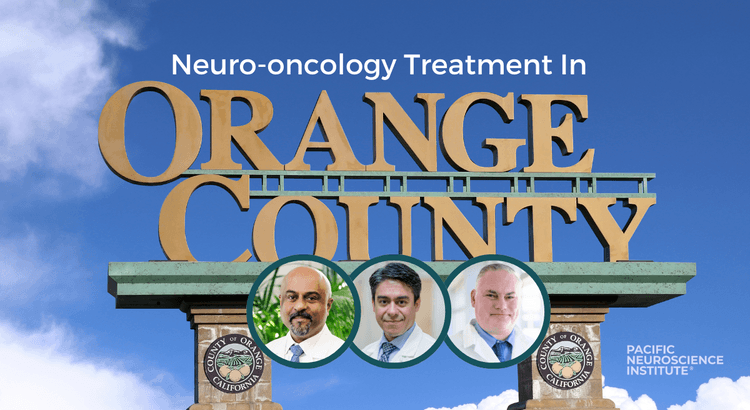

There’s More to Neuro-Oncology Than Chemo and Radiation
by Scott Turner
You may have heard of the most commonly known types of neuro-oncology treatments: Chemotherapy and Radiation. But there are many more therapies that can help treat brain and spine tumors at Pacific Neuroscience Institute® (PNI).
When a patient is diagnosed with a central nervous system (CNS) tumor, I or one of my neuro-oncologist team colleagues at the Pacific Brain Tumor Center is consulted.
What is Neuro-oncology?
Neuro-oncology is a specialized branch of medicine focused on diagnosing, treating, and managing tumors in the CNS which includes the brain, spinal cord, and surrounding tissues. These tumors can be either benign (non-cancerous) or malignant (cancerous) and originate from various cell types within the CNS.
In addition, we assist patients who are struggling with associated side effects such as neuropathy and ‘chemobrain’. Chemo-induced neuropathy typically affects the distal extremities while chemobrain relates to cognitive issues that can occur during or after treatment affecting memory, concentration, etc. and can also cause brain fog.
We adopt a multidisciplinary approach, involving neurologists, neurosurgeons, radiation oncologists, medical oncologists, neuropathologists, and other healthcare professionals. This collaboration is essential for providing comprehensive care to patients with brain and spinal cord tumors.
Our primary goals in neuro-oncology are to accurately diagnose CNS tumors, develop personalized treatment plans, and optimize patient outcomes. Diagnosis typically involves imaging studies like magnetic resonance imaging (MRI) or computed tomography (CT) scans to visualize the tumor and assess its size, location, and effect on surrounding structures. A biopsy or surgical resection may be performed to obtain a tissue sample for histopathological analysis, which helps determine the tumor’s type, grade, and molecular characteristics.
Leading-Edge Treatments and Therapies
Treatments for aggressive and malignant brain tumors, such as glioblastoma and chordoma, often require a combination of surgery, chemotherapy, immunotherapy, radiation, and clinical trial options. At PNI, a broad range of innovative treatments and clinical trials are available for patients with these tumors.
Glioblastoma Treatment
Our neuro-oncology experts work closely with neurosurgeons to determine the appropriate follow-up therapy for residual malignancies. Glioblastoma (GBM) has a challenging prognosis. Our specialists employ advanced therapy options to extend and improve patients’ quality of life.
Genomic Brain Tumor Sequencing
We conduct detailed genomic and proteomic analyses on brain tumors. This includes Next Generation Sequencing, microRNA profiling, and proteomic analyses. We also use advanced techniques like circulating tumor cells and circulating tumor DNA. These analyses help us understand the genetic and molecular changes in brain tumors, identify the driving genes, and comprehend treatment resistance mechanisms.
Approaches in Neuro-Oncology
Standard of Care
Standard treatments, including debulking surgery followed by whole-brain radiation and temozolomide chemotherapy, are used when no other options are available, representing the best approach for patients.
Radiation
Whole-brain radiotherapy is reserved for diffuse or widespread disease and more focused radiotherapy is preferred to spare as much of the brain for side effects of radiation.
Personalized Precision Therapy
Each patient’s tumor DNA is tested and profiled to identify the most suitable targeted treatment based on molecular and genetic abnormalities. This precision medicine approach aims to achieve tumor remission and, potentially, a cure. Findings from sequencing can lead to established treatments or new clinical trial options.
Immunotherapy
Cancer immunotherapy activates the body’s immune system to combat cancer. Some immunotherapies are FDA-approved, while others are available through clinical trials and specialized protocols. Immunotherapies precisely target cancer cells and enhance the immune system’s efficiency in attacking abnormal cells.
Additional Approaches
Innovative technologies, such as tumor-treating fields (TTFields) devices like Optune, are also employed. These cap-like devices use low-intensity electrical fields to disrupt tumor cell division, thereby slowing or stopping disease progression. Optune is FDA-approved for both newly diagnosed and recurrent GBM.
Clinical Trials
We are dedicated to discovering new treatment options for brain cancer through research and clinical trials. My practice is focused in Orange County and at Saint Joseph Hospital we are currently participating in the GBM Agile trial.

Spotlight on Orange County, California
Pacific Neuroscience Institute® boasts a comprehensive neuro-oncology network serving Southern California Providence hospitals across West Los Angeles, the South Bay and the San Fernando Valley. In recent years, we have expanded our neuro-oncology services to reach as many patients as we can including several key facilities in Orange County.
Saint Jude Medical Center/Specialty Clinic
2151 N. Harbor Blvd. Suite 3100, Fullerton, CA 92835 | Phone: 714-446-5830
Saint Joseph Hospital – Multi-Disciplinary Care
1000 W. La Veta Ave., Orange, CA 92868 | Phone: 714-734-6294
Leonard Cancer Institute
27799 Medical Center Rd., Mission Viejo, CA 92691 | Phone: 949-573-9469
For more information about neuro-oncology treatments for brain tumors, please contact our clinic at the numbers listed above or via email at neuro.oncology@providence.org.
Pacific Neuroscience Institute is at the forefront of neuro-oncology, offering leading-edge care and innovative treatments to enhance patient outcomes and quality of life.
Useful Links
About the Author

Scott Turner
Scott Turner, MD, is a board-certified neurologist specializing in neuro-oncology at the Brain Tumor Center at the Pacific Neuroscience Institute®. An experienced clinician, Dr. Turner’s practice in Orange County, CA, is focused on benign and malignant primary brain and spine tumors as well as metastatic tumors, peripheral nerve tumors, pituitary and acoustic tumors, and the neurologic complications that stem from oncologic disease. Dr. Turner strives to provide effective treatments that also maximize quality of life along with compassionate and individualized care of his patients and their loved ones. He has been a principal investigator and sub-investigator on numerous clinical trials, and he is an ardent proponent of research and leading-edge treatments based on individualized genetic data from each patient’s tumor.
Last updated: July 2nd, 2024